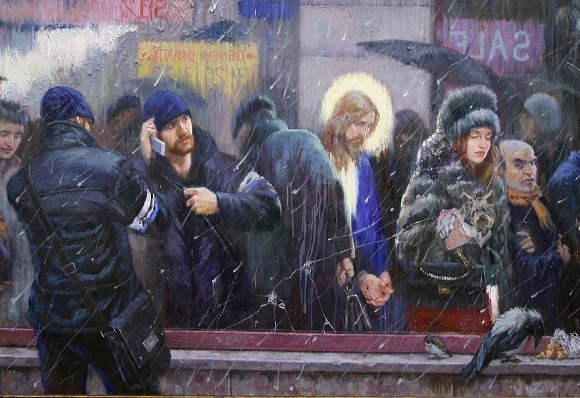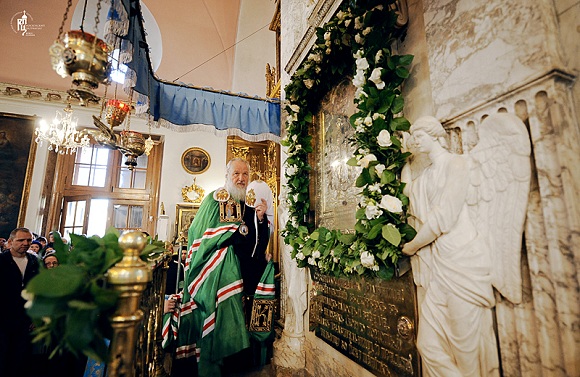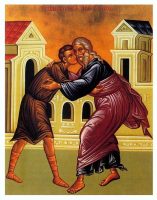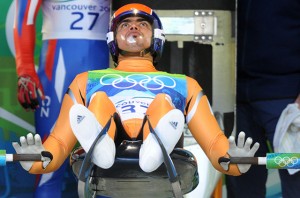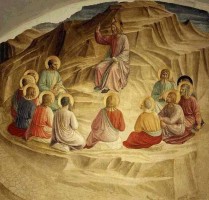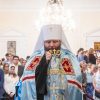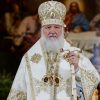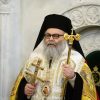His Holiness, Patriarch Kirill of Moscow and All Russia, delivered the following sermon on November 6, 2011, in the Church of the Joy of All Who Sorrow on Bolshaya Ordynka Street in Moscow. In his sermon, His Holiness combines a consideration of the Sunday Gospel reading (Luke 16:19-31) with reflections on the feast day of the Icon of the Joy of All Who Sorrow, which that year fell on Sunday. This year the icon is commemorated on this coming Tuesday.
Your Eminences and Graces! Dear Vladyka Hilarion!
I would like to thank you cordially for your kind words, for the wonderful gift of the icon of St. Alexis, Metropolitan of Moscow, and for the vestments that were sewn to match those depicted on this icon.
Indeed, the Church is called upon to preserve tradition for one simple reason: because it is in the Church that man overcomes time. We have various means of dipping into the past: we can, for instance, read books or watch historical films – but this only makes us spectators of the past. In the Church, however, man becomes not just a spectator but, by the power of the Holy Spirit, a participant in all that the Lord has done for our salvation and even in that which is to come: in His birth, life, preaching, suffering, death, Resurrection, Ascension to the right hand of the Father, and His glorious Second Coming.
It is in the Church, by the power of the Holy Spirit, that we, who are limited and weak, can partake of eternity through the Holy Mysteries; we can partake of that which was, which is, and which will be. It is in the Church, by the power of the Holy Spirit, that the Kingdom of God is revealed to us. It is no accident that at the beginning of the Church’s primary Mystery, that of the Holy Eucharist, we loudly proclaim these great words: “Blessed is the Kingdom of the Father, and of the Son, and of the Holy Spirit!” This is because it is by the power of the Holy Spirit, through the prayers of the Church’s faithful, and in the community of the faith that the Kingdom of God is revealed to us.
We can come into contact with the Kingdom, although only slightly, while still living in this sinful world; but we do not always live according to the Law of God, rather we often live according to the law of passion and sin. How often this fleeting contact with the Kingdom of God during the Divine Liturgy – which calls forth joy, peace, and rest in our hearts – quickly vanishes and dissipates. Then once again we are left face to face with sin, with the passions, with sorrows…
But the Lord grants us the great opportunity of constantly coming into contact with His eternal and heavenly Kingdom: this means of coming into contact with God is prayer. Prayer possesses great power, but there is one necessary condition for our prayer truly to unite us with the Lord; there is one condition that must be met for God to answer our prayers.
In today’s reading from the Gospel according to Luke we are offered the Savior’s parable of the rich man and Lazarus (Luke 16:19-31). This is one of the few places in Holy Scripture that offers us a glimpse of the mystery of the afterlife. Most likely no human words, knowledge, or categories of thought can give visible expression to the world that exists after man’s physical death. The Lord therefore speaks about this world in a language understandable to his hearers. He tells the parable of the rich man who lived sumptuously and the unfortunate and hungry Lazarus, who lay at the rich man’s gate covered in sores. Following his death, the unfortunate Lazarus – who had been covered in sores, who had been humiliated and powerless – found himself in the bosom of Abraham, in the Heavenly Kingdom; but the rich and successful man found himself in hades.
Reflecting on the meaning of this parable, St. Cyprian of Carthage spoke words that St. Basil the Great later repeated. These words help us to understand the necessary condition for God to hear our prayers: “If we do not hear the entreaties of the poor, then we are undeserving to have our prayers heard by God.” What wonderful and astonishing words! They resonate with the foundational “golden” rule of life laid down in the Gospel: Therefore all things whatsoever ye would that men should do to you, do ye even so to them (Matthew 7:12).
These words can also be paraphrased so as to say: “How you want the Lord to treat you is how you should treat your neighbors,” because the Lord appears to us in the image of our neighbor. If we are indifferent to the sorrows of others, if our hearts are deaf and unresponsive to human sorrow and need, then we will pray and weep in vain – these will be crocodile tears, tears for ourselves, tears that are not pleasing to God. Our prayer must be accompanied by help and love for our neighbors. Then we will be with Lazarus in the bosom of Abraham, then the Lord will hear our sighs.
As St. Cyril put it so beautifully, the entire mystery of our spiritual lives depends on this. There can be no prayer without good deeds; there can be no hope of salvation without good deeds, for faith without works is dead (cf. James 2:17).
When we enter this church with all our sorrows, when we bow down before the Icon of the Joy of All Who Sorrow and ask the Queen of Heaven to help us in our sorrow, let us then recall: Have we always helped the sorrowful? Have we not coldly and heartlessly passed by those asking for help? Have we perhaps justified ourselves by saying: I will not help them, they are such-and-such; there is no need to waste strength of soul and time on them… Then why should the Mother of God help us? Only because we are weeping before the icon from the pain that life circumstances have inflicted upon our hearts? Is this enough? St. Cyprian teaches us: no, it is not enough.
This is why an Orthodox parish or community that celebrates the Holy Eucharist, which comes into contact with the Kingdom of God by the power of the Holy Spirit, should be a place of mercy, charity, and real love – perhaps first of all to needy parishioners, to those standing right next to us: those who might not eat today after the Divine Liturgy; those who might shiver from the cold because their clothing is poor; those who live in unknown circumstances. After all, it often happens that people who come to church are alone and do not have what others have, for which reason they are seeking our help here. The Lord can send such help only through us, through our hands. Then, having graciously responded to the pain and suffering of another person, we will be heard by God and His Most Pure Mother, receiving that for which we have prayed.
All of this is taught to us by today’s feast day of the Icon of the Joy of All Who Sorrow; the wonderful Gospel reading teaches us this as well, unlocking the mystery of the afterlife; and that great saint, Cyprian of Carthage, who upheld Orthodoxy during the difficult persecution of faith in the third century, also teaches us this. Let us listen to these words and to this call, recognizing the connection between salvation and good deeds! As we embark on the path of performing good deeds, may the Lord grant us the joy of feeling His real presence in our lives! And may this feeling strengthen in us the faith and determination to do good for the glory of His holy name! Amen.












